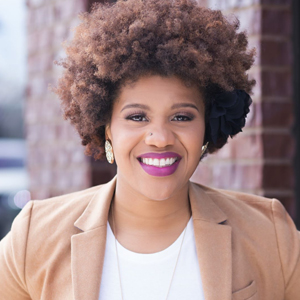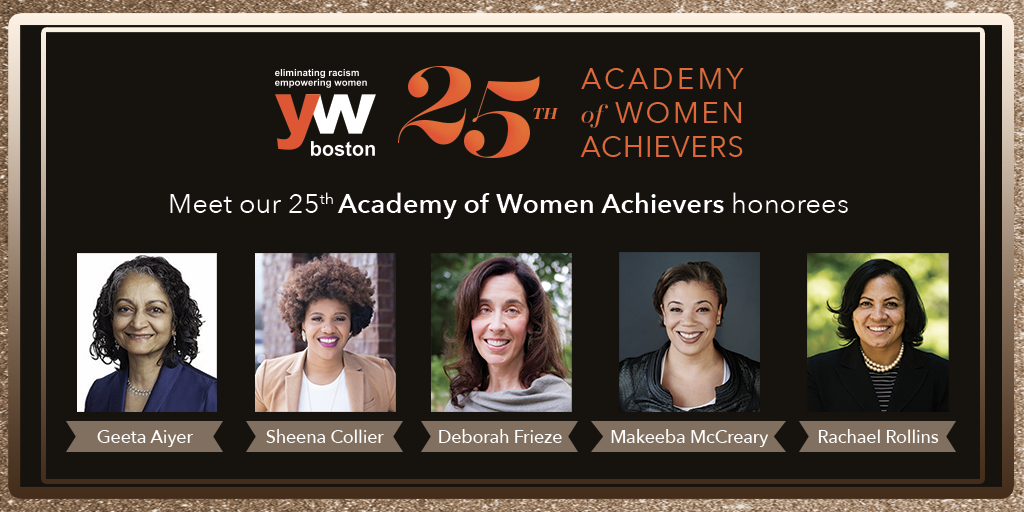Meet Sheena Collier, 2020 Academy of Women Achievers Awardee

On June 2nd, 2020 we will join together and celebrate the achievements of five unstoppable women who demonstrate YW Boston’s mission of eliminating racism and empowering women at our 25th Anniversary Academy of Women Achievers Luncheon.
Since 1995, as part of our mission to promote and celebrate the achievements of women, YW Boston has held the Academy of Women Achievers luncheon. Through this event, we recognize and honor some of Boston’s brightest, boldest, bravest, and most influential women. Leading up to the event, we are sitting down with each of the 2020 awardees for interviews and releasing one each month.
YW Boston cannot wait to induct Sheena Collier into the Academy of Women Achievers. She is the Founder & CEO of The Collier Connection, at which she is creating an ecosystem in Boston that better connects black transplants to resources, information, experiences, and each other. She is the third annual Sylvia Ferrell-Jones Awardee, an award named after YW Boston’s former President & CEO and presented to a young woman of color who is a leader in her field. To learn about Sheena, read our interview with her:
_
We are thrilled to honor you at our 25th Academy of Women Achievers on June 2nd as the Sylvia Ferrell-Jones Awardee. Can you tell us about your history with YW Boston and what it means to you to be honored in Sylvia’s name?
I was beyond honored and even shed a tear when I was notified that I was receiving this award named after Sylvia. She had a graceful spirit that was felt around the city. Her and I were not close, but she occasionally took the time to reach out to me to let me know she was watching and was proud of me. She even dedicated a Facebook post to me once! As a young Black woman finding her way professionally, it meant a lot to know that she noticed me.
You describe yourself as a “super connector”. Can you please speak to your background, and how you discovered this about yourself?
After attending Spelman College in Atlanta, GA, I moved to the Boston area to attend the Harvard Graduate School of Education in 2004. I didn’t know anyone or have a network, so I built one. I started and joined organizations, became civically engaged, and hosted events that connected me to lots of different worlds, including education, politics, arts, community organizing, and business. I made connections that changed my life and learned techniques to navigate (and eventually enjoy) the city. This helped me build a supportive community that I now leverage to benefit others. I love creating spaces for people to connect and get joy from introducing people to each other, valuable information, or new experiences. I am doing this ALL the time, which has made me into a super connector.
As someone who moved to Boston for graduate school, and who welcomes newcomers, why do you think people find Boston to be a particularly hard place to build connections? How may this be exacerbated for women of color, and black women in particular?
I have made Boston my home and am invested in seeing the city continue to improve, so I say all of this with love. The Boston brand has traditionally been exclusivity: who do you know, who knows you, who will vouch for you, are you “in”. Transplants are initially not trusted because there isn’t someone who can co-sign them and their intentions.
Boston is very resource-rich, which on the surface seems like a good thing. However, there are not a lot of central vehicles for information to flow, so many people do not know what or who is here. There is also a terrible unofficial marketing campaign as it pertains to who lives here and what it means to be a Bostonian. Before I lived here, and even a few years after I had already moved here, I did not know there were such large communities of color and a rich history of Black people who have been here for generations.
As a woman of color, and Black woman in particular, the perception and reality of Boston’s issues related to race, racism, and who gets access exacerbates these problems. So many of us come for rich educational or economic opportunities, but don’t plan to stay beyond a few years and don’t invest in becoming a part of the social infrastructure.
The Society 1925 dinners you host bring together newcomers to Boston and long-time Bostonians. Can you please share a story of a connection fostered at one of these gatherings?
I named the Society 1925 dinners after the Harlem Renaissance, an intellectual, social, and artistic explosion centered in Harlem throughout the 1920’s. In the year 1925, it became known as the “New Negro Movement,” a declaration of overt racial pride, a new Black identity, and a rebirth of artistic expression. The format of the dinners are based on the salons that were held during that time that brought together leading figures in literature, culture, and politics.
Society 1925 dinners facilitate a meaningful intersection of individuals to build lasting personal and professional relationships, with a particular focus on bridging the gap between transplants and locals. I have surveyed attendees 3 to 6 months after attending a dinner and have learned about real connections that lasted beyond dinner Here is one testimonial:
“I met Gabriella at the August dinner and we’ve since connected via social media, gone to brunch, we often text each other and occasionally talk on the phone. I’ve been able to connect her to some other folks and organizations and it’s awesome running into her at events!”
Tell us about the resource you are building, Boston While Black.
Through the The Collier Connection, we are strengthening the ecosystem for Black professionals that disrupts the ways they seek information, access, and belonging in cities. In 2021, we are launching Boston While Black—a membership network of programs, events, and a digital platform that connects Black grad students and professionals to resources, experiences, and each other. Imagine a law student or new tech hire who moves to Boston for a good opportunity, but has no idea where to connect with other Black professionals. Or a company who is trying to attract a prospective employee who is deciding between moving here and another city that is more known for a connected Black community. Boston While Black gives them the opportunity to know how to plug themselves or their potential talent into the social infrastructure of the city. We are building an annual summit, a summer welcome party, monthly social events, connections to mentors, and a digital network that teaches them how to navigate Boston. We want to create a city where Black professionals know how to find their tribe, grow their network, navigate the city, and have fun.
What advice do you have for young professionals of color in Boston looking to build stronger connections?
Create the city that you want to live in!
_
Learn more from Sheena Collier at our 25th Annual Academy of Women Achievers Luncheon on Tuesday, June 2, 2020.


